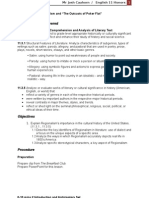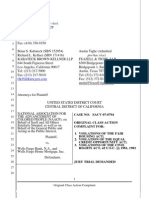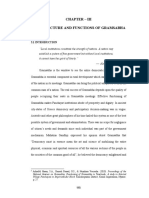Kami Export - THEA 2030 FALL 2024 WS-17
Kami Export - THEA 2030 FALL 2024 WS-17
Uploaded by
jadenniko06Copyright:
Available Formats
Kami Export - THEA 2030 FALL 2024 WS-17
Kami Export - THEA 2030 FALL 2024 WS-17
Uploaded by
jadenniko06Copyright
Available Formats
Share this document
Did you find this document useful?
Is this content inappropriate?
Copyright:
Available Formats
Kami Export - THEA 2030 FALL 2024 WS-17
Kami Export - THEA 2030 FALL 2024 WS-17
Uploaded by
jadenniko06Copyright:
Available Formats
THEA 2030 FALL 2024
WORKSHEET 17
Name:
Date:
Section:
Consider the material you read and watched this week to answer the questions below. Remember
to use complete sentences. When quoting one of the scholars, please use quotation marks.
1. What is the thesis of Justin Emeka’s “Seeing Shakespeare through brown eyes” and how
does he interrogate the thesis? Think about what claim he makes and the method through
which he explains this claim.
Emeka's thesis is that Shakespeare's works can be reinterpreted tn a way that centers African American culture, allowing for new insight. Emeka
also claims that Shakespeare's works lack the diverse perspectives that people of color's stories and experiences are so full of. Justin
"interrogates" this thesis by use of personal stories and narratives, critical analysis, and some of his own directing work.
2. What is color blind casting? Have you encountered this term prior to this class? If so, in
what context?
Color blind casting is when you cast roles without having an actors race or ethnicity in mind. You instead choose the best actor for the role
based on how well they can play the part or their talent. I feel like I've heard this before and assumed this was what it was but I have no idea
what context it was in.
3. Justin Emeka discusses a few cases of color blind casting in different performances of
Shakespeare, such as “The Africanization of King Lear.” Discuss one of these cases.
What is the case being discussed? What was the experience for the actor or the audience?
What did you learn in reading this case?
Justin Emaka reimagined the play of King Lear with an African American cultural context. This not only allowed the actors to more deeply connect with
the play and their characters making their performances so much richer, but gave the audience a more interesting perspective allowing for more
engagement.
4. Consider the performance of Richard III that we watched this week. How does this
reading inform your engagement with the performance?
The reading allows me to realize that the performance of Richard III we watched emphasizes themes of power, manipulation, and ambition and when paired
with a color-blind casting allows the audience to think about these themes in a contemporary manner rather then an old historical white centered context.
5. What questions do you have about the materials? (Please write at least one question for
class today.)
Who was the first to consider or introduce color blind casting?
You might also like
- The Centurion Method: Complete Age of Iron Edition57% (7)The Centurion Method: Complete Age of Iron Edition374 pages
- Sample Test Bank For Management An Integrated Approach 2nd Edition by Ranjay GulatiNo ratings yetSample Test Bank For Management An Integrated Approach 2nd Edition by Ranjay Gulati7 pages
- Only Thing To Fear by Caroline Tung Richmond Excerpt57% (7)Only Thing To Fear by Caroline Tung Richmond Excerpt29 pages
- MODULE 1 - CHARACTERS and CHARACTERIZATION100% (2)MODULE 1 - CHARACTERS and CHARACTERIZATION10 pages
- Precis - Grassroots Globalisation and The Research Imagination, Arjun AppaduraiNo ratings yetPrecis - Grassroots Globalisation and The Research Imagination, Arjun Appadurai5 pages
- IGCSE English Literature 0475 Past Paper June2022No ratings yetIGCSE English Literature 0475 Past Paper June20226 pages
- Detailed Lesson Plan (DLP) Format: En9Lt-Iiia16 I. Objectives100% (2)Detailed Lesson Plan (DLP) Format: En9Lt-Iiia16 I. Objectives2 pages
- Henrik Ibseb's A Doll's House: Themes and Elements of Style: A Guide to Henrik Ibsen's A Doll's House, #2From EverandHenrik Ibseb's A Doll's House: Themes and Elements of Style: A Guide to Henrik Ibsen's A Doll's House, #2No ratings yet
- Contemporary Lit Portfolio Activities Aug-Dec 2022No ratings yetContemporary Lit Portfolio Activities Aug-Dec 202229 pages
- Critiquing A Literary Selection Formalist Approach 2No ratings yetCritiquing A Literary Selection Formalist Approach 232 pages
- Henrik Ibsen's A Dolls House: Answering Excerpt & Essay Questions: A Guide to Henrik Ibsen's A Doll's House, #3From EverandHenrik Ibsen's A Dolls House: Answering Excerpt & Essay Questions: A Guide to Henrik Ibsen's A Doll's House, #3No ratings yet
- Jessica Zappala Unit Plan Final Compressed100% (1)Jessica Zappala Unit Plan Final Compressed138 pages
- Lecture African American Art and ArtistsNo ratings yetLecture African American Art and Artists22 pages
- Teaching Ideas To Use With The Signet Classic Shakespeare SeriesNo ratings yetTeaching Ideas To Use With The Signet Classic Shakespeare Series4 pages
- Chapter 1: Introduction 1.1 Statement of The ProblemNo ratings yetChapter 1: Introduction 1.1 Statement of The Problem13 pages
- Kami Export - Play Worksheet THEA 2030 FALL 2024No ratings yetKami Export - Play Worksheet THEA 2030 FALL 20241 page
- Open MicRiffs On Life Between Cultures in Ten Voices: Teachers' Guide100% (1)Open MicRiffs On Life Between Cultures in Ten Voices: Teachers' Guide5 pages
- Chronicles of The Mumbai Blasts Neeraj FinalNo ratings yetChronicles of The Mumbai Blasts Neeraj Final21 pages
- Category 3: Studies in Language: A) Description of The Category 3 Extended EssayNo ratings yetCategory 3: Studies in Language: A) Description of The Category 3 Extended Essay3 pages
- The Feudal System and The Manor System-0No ratings yetThe Feudal System and The Manor System-023 pages
- Appeal Under Section 173 of Motor Vehicles Act, 1988-Drafting-Civil TemplateNo ratings yetAppeal Under Section 173 of Motor Vehicles Act, 1988-Drafting-Civil Template2 pages
- America's Unknown Enemy - Beyond - American Institute For EconomicNo ratings yetAmerica's Unknown Enemy - Beyond - American Institute For Economic155 pages
- Plaint Against Wells Fargo Bank Wells Fargo Home Mortgage100% (3)Plaint Against Wells Fargo Bank Wells Fargo Home Mortgage21 pages
- Understanding PP Through Its Instruments PDFNo ratings yetUnderstanding PP Through Its Instruments PDF21 pages
- Sukarno'S Proclamation of Indonesian Independence George Mct. KahinNo ratings yetSukarno'S Proclamation of Indonesian Independence George Mct. Kahin4 pages

























































































